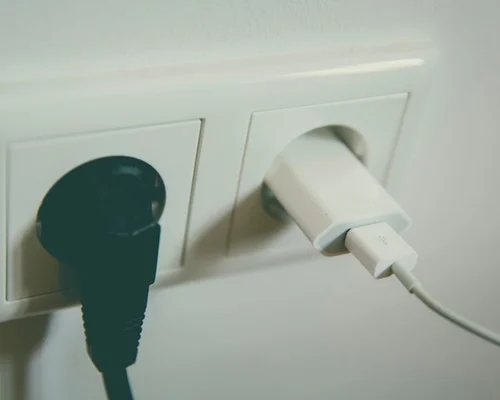According to the U.S. Fire Administration, electrical malfunctions cause over 20,000 residential fires per year.
The USFA also notes that some fires are caused by electrical system failures, but incorrectly installed wiring and overloaded extension cords and circuits lead to many more.
It’s not uncommon that each family member has a handful of gadgets or perhaps you’d find a TV in various rooms throughout most homes.
Electricity is certainly a powerful tool that makes most of our lives easier, but if used incorrectly it can open you and your family up to very real dangers.
What Can You Do?
Luckily, there are many precautions you can take in ensuring you have a safe home:
- Check electrical outlets for loose-fitting plugs; these can cause shocks or even start fires. Don’t leave any inner wirings exposed, replace any broken or missing wall plates ASAP! (Especially if you have children).
- Regularly check electrical appliance cords and don’t hesitate to replace any item that has a frayed cord or often shorts, overheats, or sparks.
- Do your outlets or switches get hot? Call an electrician to do a safety check on the system.
- Avoid overloading extension cords or wall sockets and don’t use an indoor extension cord for outdoor use. Remember these should only be used temporarily if you’re using them daily go ahead and invest in additional outlets.
- Replace bulbs that have higher wattages than recommended for different lamps and light fixtures.
- Double check that your home is furnished with GFCI (Ground Fault Circuit Interrupter) outlets near any areas that are close to water such as your kitchen area, bathrooms, laundry room, the garage or outdoor circuits.
- Always turn off an appliance before unplugging
- Use plug-in covers, like this, to prevent children from sticking things into the socket.
- Turn off small appliances when not in use.
- Wear rubber sole shoes when using electricity in wet areas.
Important Reminders:
- Never attempt to extinguish an electrical fire with water, keep approved fire extinguishers in your home.
- Don’t touch electrical appliances or switches with wet hands. If you have children in your home, it may be a good idea to remind them of this.
- Avoid pulling appliances by the cord (like a vacuum cleaner).
- Placing objects like a blanket or dirty laundry on top of lamps can be hazardous.
If you find that you have a faulty appliance or notice one of these hazards in your home, be sure to enlist the assistance of a licensed electrician. Attempting to repair electrical things on your own could be a short solution that has big repercussions in the end.
This list of electrical hazards to watch out for in your home doesn’t have to be the end of your safety practice.
If you have small ones at home, it is worth a conversation about electricity safety. There are even games online that you can use to get your kids interested!
What are some measures you’ve taken to keep your home safe?

